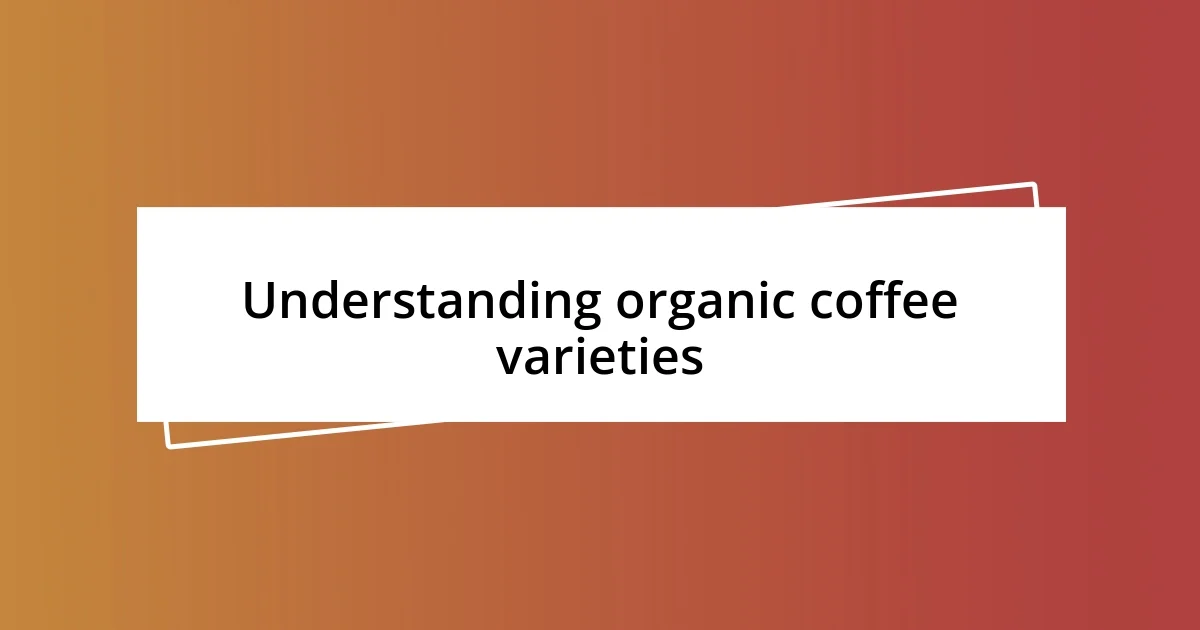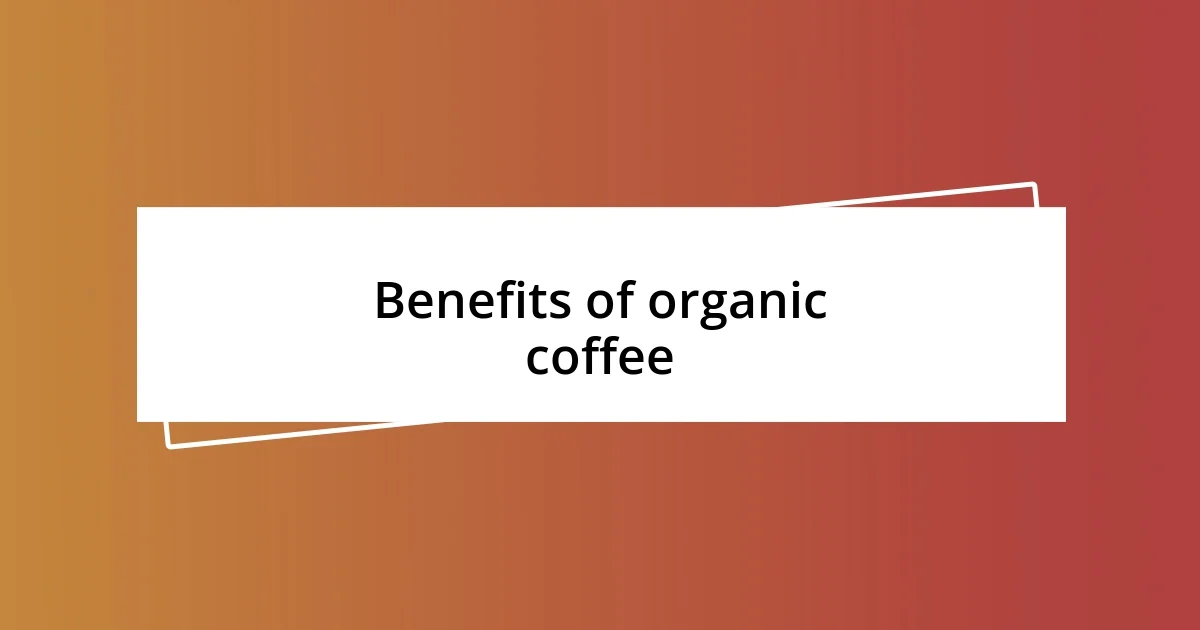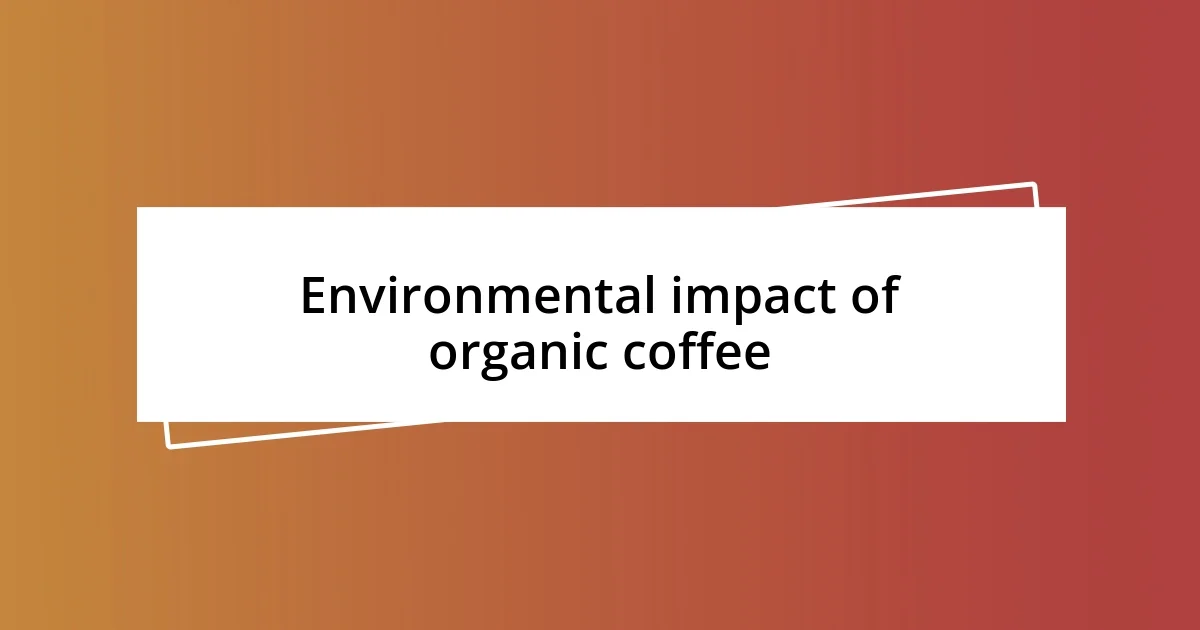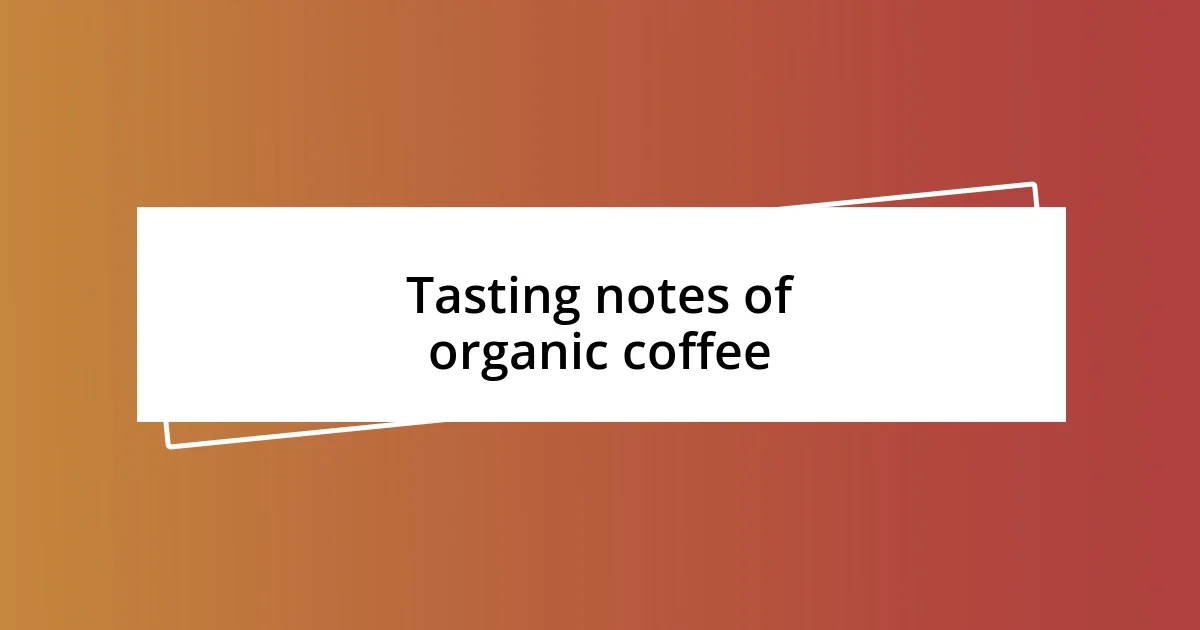Key takeaways:
- Organic coffee’s flavor and quality are significantly influenced by sustainable farming practices and the unique terroir of growing regions.
- Choosing organic coffee supports health-conscious choices, fair trade, and better livelihoods for farmers while providing a richer flavor profile.
- Brewing methods, such as pour-over and French press, can enhance the nuanced flavors of organic coffee, making each cup a unique experience.

Understanding organic coffee varieties
When it comes to organic coffee varieties, I find that the term “organic” extends beyond just the farming method. It embraces a commitment to sustainability, quality, and respect for nature. I remember the first time I sipped an organic brew and felt the vibrant flavors dancing on my palate, making me realize how much the growing conditions influence the final product.
These varieties are often grown in rich, biodiverse environments, which adds layers of complexity to each cup. Isn’t it fascinating how the terroir—essentially the land and its characteristics—can shape not just the taste but the entire experience of drinking coffee? I recall exploring the lush landscapes of a coffee farm in Colombia, where I learned that different regions produce beans with unique flavor profiles, from fruity to nutty and everything in between.
Moreover, organic coffee often involves specific varietals like Arabica or Robusta, each bringing its own strengths to the table. I’ve brewed batches from both and noticed that Arabica tends to have a smoother, more nuanced flavor, while Robusta packs a stronger punch, making the discussion of these varieties not just about farming practices but also personal taste. Which variety resonates with you?

Benefits of organic coffee
Organic coffee offers several benefits that resonate with both health-conscious consumers and environmentally minded individuals. From my experience, one of the most significant advantages is that organic coffee is free from synthetic pesticides and fertilizers. I vividly remember the first time I switched to organic; it felt like I was not only making a healthier choice for myself but also supporting sustainable farming practices that protect our planet.
Another essential benefit lies in the enhanced flavor profile of organic coffee. These beans often have richer, more diverse tastes, attributed to the careful cultivation methods employed by organic farmers. The first time I savored a cup from an organic farm in Ethiopia, the bright fruit notes were unlike anything I’d tasted before, awakening my senses in a way that non-organic options simply couldn’t. There’s something truly special about knowing that the coffee in my cup comes from a process that prioritizes quality and environmental health.
Moreover, supporting organic coffee means you are contributing to fair trade practices and better livelihoods for farmers. From my perspective, choosing organic often goes hand in hand with supporting small-scale farmers who invest in their communities. I remember chatting with a farmer who shared how organic certification allowed him to improve his children’s education and access healthcare. It’s not just coffee; it’s a story of empowerment and mutual respect for both the farmers and consumers.
| Benefit | Description |
|---|---|
| Healthier Choice | Organic coffee is grown without harmful pesticides and chemicals. |
| Enhanced Flavor | Offers richer and more complex tastes due to organic farming methods. |
| Supports Farmers | Contributes to fair trade practices and better livelihoods for farmers. |

Popular organic coffee types
When diving into the world of popular organic coffee types, I can’t help but recall my first encounter with single-origin Ethiopian coffees. The complexity of the flavors—from sweet berries to a subtle floral aroma—was like a journey for my taste buds. This variety is renowned for its unique characteristics due to the high-altitude growth conditions and careful harvesting methods, which really emphasizes how organic farming can enhance flavor profiles in remarkable ways.
Another favorite of mine is the creamy and chocolaty notes found in organic Guatemalan coffee. During a visit to a small farm in the highlands, I experienced firsthand how the farmers carefully select their beans. Each sip of that coffee felt personal, as if I was connecting directly with the land and the people who cultivated it. The experience made me realize that every cup of coffee carries a story—one that reflects the dedication and care of those behind it.
- Arabica: Known for its smooth and nuanced taste, Arabica coffee is the most commonly grown variety and has a wide range of flavor profiles.
- Robusta: This variety has a stronger, bolder flavor with higher caffeine content, making it a favorite for espresso blends.
- Ethiopian: Celebrated for its complex flavors, this single-origin coffee often features fruity and floral notes, directly influenced by its unique growing conditions.
- Guatemalan: With a rich, chocolaty taste, Guatemalan coffee is smooth and often carries hints of spice, reflecting the country’s diverse terroir.
- Colombian: Renowned for its well-balanced flavor, Colombian organic coffee is often fruity and nutty, encapsulating the essence of the region’s vibrant landscape.

Brewing techniques for organic coffee
When it comes to brewing organic coffee, the method you choose can make a significant difference in the final flavor. I often find myself gravitating toward the pour-over technique. It allows for full control over the brewing time and water temperature, enhancing those delightful nuances in the beans. Have you ever tasted a cup brewed this way? I remember the first time I drizzled water over the grounds slowly; the coffee bloom released such an enticing aroma that it felt like an invitation to truly savor each sip.
Another technique I’ve embraced is the French press. There’s something so satisfying about coarsely grinding the beans and letting them steep for a few minutes. I can still recall the morning I waited patiently, watching the thick, golden liquid swirl as I pressed the plunger. The richness encapsulated in that cup was an experience I won’t soon forget. It’s a more robust flavor profile that often resonates with those who appreciate the natural oils present in organic coffee.
I’d also suggest experimenting with cold brew for a refreshing twist. I remember preparing a batch one hot summer day, letting the grounds steep overnight with cool water. The result was a smooth, slightly sweet brew that went perfectly over ice. It made me wonder—how do you prefer your organic coffee served? Each brewing method brings its personality to the coffee, making your choice a canvas for your mood and taste.

Purchasing tips for organic coffee
When I’m on the hunt for organic coffee, I always pay close attention to the labeling. Look for certifications like USDA Organic or Fair Trade, which ensure you’re getting quality beans that meet specific environmental and ethical standards. I can remember the excitement of finding a brand that proudly displayed these labels—it’s like a little badge of honor for the farmers and the land.
It’s also essential to consider the roast date. Freshness can dramatically impact flavor, and I often seek out beans roasted within the last couple of weeks. I recall visiting a local coffee shop where they showcased their roasting schedule on a chalkboard. The vibrant, bold flavors in my cup were a testament to that fresh roast—each sip was full of life, making it so clear that freshness matters.
Finally, don’t shy away from exploring different origins and varieties. Each region offers its unique charm, and I love chatting with baristas or shop owners about their recommendations. One time, I took a leap of faith and tried a new organic Brazilian blend, and it blew me away with its nutty undertones and smooth finish. Isn’t it thrilling to discover something that surprises your palate? The journey of finding the perfect organic coffee can become an adventure all its own.

Environmental impact of organic coffee
The environmental impact of organic coffee is quite remarkable. By practicing sustainable farming methods, organic coffee minimizes the use of harmful pesticides and synthetic fertilizers. I remember learning about how this helps preserve local ecosystems. Isn’t it fascinating that by choosing organic, we’re also supporting the biodiversity of the farming areas?
Moreover, organic farming techniques often encourage shade-grown coffee cultivation, which promotes healthier habitats for wildlife. I once visited a farm that employed this method, and it was incredible to see the harmony between the coffee plants and the native animals. Imagine sipping your morning brew, knowing that it contributes to such a balanced environment.
Lastly, the way organic coffee farmers focus on soil health substantially benefits the land in the long run. I’ve seen firsthand the dedication farmers have toward enriching their soil through composting and crop rotation. Can you picture the difference that makes? A healthier soil not only produces better coffee but also contributes to the fight against climate change by sequestering carbon. It’s a win-win!

Tasting notes of organic coffee
When savoring a cup of organic coffee, I often find myself captivated by its intricate flavor profile. For instance, the first sip of a light roast might reveal a delightful citrus brightness, followed by a subtle sweetness that reminds me of ripe stone fruits. It’s almost like a conversation with the coffee itself, each layer inviting me to explore deeper nuances. Have you ever noticed how certain coffees can evoke memories? A hint of chocolate can transport me back to cozy cafés where I spent hours studying—those rich flavors wrapping around me like a warm blanket.
I also appreciate how organic coffee can differ significantly from its non-organic counterparts, often possessing a cleaner finish. I recall trying an organic Ethiopian Yirgacheffe once; I was astonished by its floral notes and the refreshing tea-like quality. The experience was more than just drinking coffee; it was sensory storytelling. Can you relate to that sensation of tasting something that paints an entire scene in your mind?
What truly stands out to me are the complex tasting notes that vary from batch to batch. For instance, I recently sampled a Guatemalan blend that presented itself with rich caramel undertones and a hint of nuttiness, each sip wrapping around my taste buds like a warm hug. That variability is exhilarating; it feels like every cup can tell a different story depending on where it’s sourced, how it’s processed, and the care of the farmers. Isn’t it amazing how a simple cup of coffee can be a reflection of its journey?














